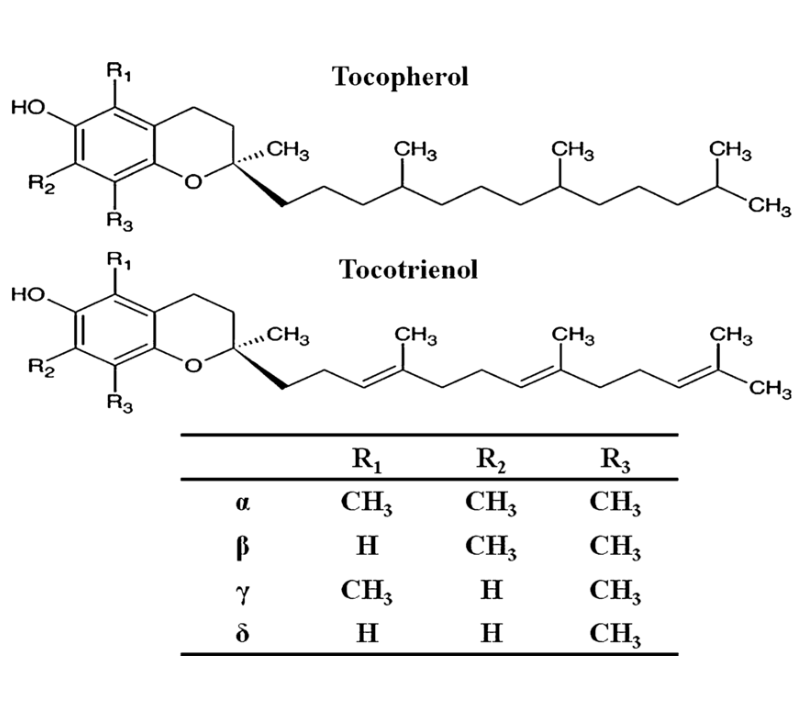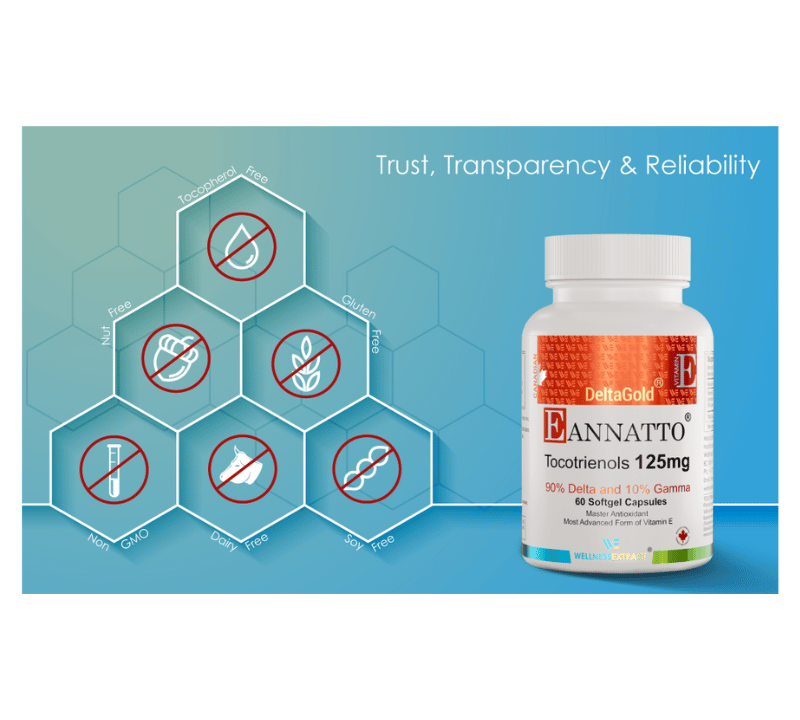Imagine a powerhouse of nutrients, cloaked in a name you might just overlook on the back of your supplement bottle. Vitamin E: it’s not just a single note in the symphony of our body's health. It's an entire ensemble, performing in harmony to bless us with vitality and well-being. Among its performers, the tocotrienols are like the unsung heroes, those virtuoso musicians waiting in the wings for their chance to shine. While you may be familiar with tocopherols, the leading stars of vitamin E, there's a fascinating undercurrent of science and health revolving around tocotrienols that many are unaware of. Ready to step into this incredible world, uncovering the secrets that could reshape your understanding of health and wellness? Grab your explorer's hat; it's time to dive deep into the contrasting brilliance of tocotrienols and tocopherols! “how do tocotrienols differ from other forms of vitamin E?”
Short Summary
- Discover the unique health benefits of tocotrienols and their enhanced antioxidant properties.
- Learn how to get the right balance of Vitamin E from dietary sources & quality supplements for optimal health.
- Unlock potential applications in prevention & treatment of various diseases with exciting discoveries in vitamin E research!
Understanding Vitamin E: Tocopherols vs. Tocotrienols
Vitamin E consists of two fascinating subfamilies: tocopherols and tocotrienols, which together form the vitamin E family. These vitamin E molecules play a crucial role in maintaining good health, but they possess distinct molecular structures and biological functions that set them apart from one another. While both are essential to human health, tocotrienols have been found to be more potent antioxidants than tocopherols, offering unique health benefits that truly set them apart.
Synthetic vitamin E supplements typically contain only alpha-tocopherol, while natural vitamin E contains all eight forms, including tocotrienols. As we explore the world of tocotrienols, which are part of the natural vitamin E family, we’ll discover their incredible antioxidant properties, brain protection capabilities, and cardiovascular health support, making them a valuable addition to our health regimen, especially when considering a vitamin e supplement.
The discovery of tocotrienols
The discovery of tocotrienols as a distinct form of vitamin E was an exciting breakthrough in the world of nutrition. Identified 20 years after the initial discovery of vitamin E, tocotrienols quickly gained attention for their more potent antioxidant properties compared to tocopherols. Further research led to the identification of tocotrienols in sources like palm oil in 1992, rice bran oil in 1998, and annatto in 2002, revealing the incredible potential of these nutrients for human health.
Tocotrienols have been shown to be significantly more potent antioxidants than tocopherols, making them an essential component for human health and a valuable addition to our dietary intake. Their remarkable antioxidant activity has sparked a wave of research exploring their potential benefits in various aspects of health and wellness.
Molecular structure differences

Although tocopherols and tocotrienols share a similar basic chemical structure, they differ in their side chains, which impacts their biological functions and health benefits. Tocotrienols, in particular, have unsaturated side chains, whereas tocopherols have saturated side chains. This difference in molecular structure influences the way they interact within the human body, leading to varied biological functions and health benefits, including:
- Antioxidant activity
- Cardiovascular health support
- Anti-inflammatory effects
- Potential benefits for the central nervous system
One interesting aspect of tocotrienol metabolism is the role of alpha-tocopherol transfer protein (ATTP) in the liver. ATTP helps alpha-tocopherol exit the liver and re-enter circulation, giving tocotrienols a greater opportunity to be metabolized or excreted. This unique interplay between tocopherols and tocotrienols further highlights the importance of understanding their molecular differences and how they impact our overall health, including lipid peroxidation processes.
Unique Health Benefits of Tocotrienols

Tocotrienols offer a range of unique health benefits that set them apart from other forms of vitamin E. Their enhanced antioxidant properties, ability to protect brain cells, and support for cardiovascular health make them an invaluable addition to our daily dietary intake.
Let’s delve deeper into these remarkable benefits of tocotrienols and uncover their potential for improving our health and well-being.
Enhanced antioxidant properties
One of the most notable characteristics of tocotrienols is their stronger antioxidant properties compared to tocopherols. These powerful antioxidants target specific free radicals, offering additional health benefits that can’t be achieved with tocopherols alone. Tocotrienols have been shown to possess neuroprotective, anti-cancer, and cholesterol-lowering properties, making them a crucial component of a well-rounded vitamin E intake.
Despite their impressive antioxidant capabilities, tocotrienols have a lower bioavailability after oral consumption compared to tocopherols. This means that it’s essential to ensure an adequate intake of tocotrienols through dietary sources and supplements to experience their full range of health benefits.
Brain protection and cognitive function
The potential of tocotrienols to protect brain cells and support cognitive function is an exciting area of research. By shielding brain cells from free radical damage and supporting cognitive function, tocotrienols may play a pivotal role in the fight against neurodegenerative diseases like Alzheimer’s and Parkinson’s.
Tocotrienols have been found to reduce the pool of two proteins that can lead to the development of Alzheimer’s disease, potentially enhancing mental clarity. This exciting discovery opens the door for further research into the potential benefits of tocotrienols for brain health and cognitive function, offering hope for those affected by these debilitating diseases.
Cardiovascular health support
Tocotrienols also play a crucial role in supporting cardiovascular health. By reducing inflammation, cholesterol levels, and other risk factors associated with heart disease, tocotrienols offer a heart-healthy solution for those looking to improve their cardiovascular health. Studies have demonstrated that tocotrienols can effectively reduce inflammation by blocking the production of pro-inflammatory cytokines.
Furthermore, tocotrienols have been proven effective in reducing cholesterol levels by inhibiting the activity of the enzyme HMG-CoA reductase, which is responsible for the production of cholesterol. By addressing these risk factors, tocotrienols provide a comprehensive approach to promoting heart health and support healthy cholesterol levels, reducing the risk of cardiovascular disease.
Potential Risks and Side Effects of Vitamin E Supplementation
hile the health benefits of vitamin E supplementation are well-established, it’s important to be aware of the potential risks and side effects associated with its use. Tocopherol supplementation, in particular, has raised concerns, while tocotrienols have demonstrated a safer profile.
In this section, we’ll explore the potential risks and side effects of vitamin E supplementation to help you make informed decisions about your health.
Tocopherol supplementation concerns
High doses of tocopherol supplements may increase the risk of cancer and heart disease, and interfere with the absorption of tocotrienols. This potential downside highlights the importance of understanding the difference between tocopherols and tocotrienols and ensuring a balanced intake of both forms of vitamin E.
It’s essential to be aware of these potential risks when considering tocopherol supplementation and to carefully monitor your intake to minimize any potential adverse effects. Consulting with a healthcare professional is always recommended to ensure the appropriate dosage and balance of vitamin E supplementation.
Tocotrienol safety profile
Tocotrienols, on the other hand, have a much safer profile compared to tocopherols. No reported adverse effects have been associated with tocotrienol supplementation, and they have even demonstrated potential cancer-fighting properties. This makes tocotrienols an attractive option for those looking to experience the benefits of vitamin E supplementation without the potential risks associated with tocopherols.
By choosing a high-quality tocotrienol supplement and following the recommended dosage guidelines, you can confidently incorporate tocotrienols into your health regimen and enjoy their numerous advantages without concern for adverse effects.
Dietary Sources and Supplements: How to Get the Right Balance

To get the right balance of vitamin E, it’s essential to consume natural sources of tocotrienols and choose a quality supplement. By ensuring an adequate intake of both tocopherols and tocotrienols, you can enjoy the full range of benefits that vitamin E has to offer and support your overall health and well-being.
In this section, we’ll explore the best dietary sources of tocotrienols and tips for choosing a high-quality supplement to help you achieve the right balance of vitamin E.
Natural sources of tocotrienols

While tocotrienols are not abundant in the diet, they can be found in sources like annatto, palm oil, and rice bran oil. Incorporating these natural sources of tocotrienols into your diet can help ensure that you’re getting an adequate intake of this important nutrient.
It is essential to note that delta- and gamma-tocotrienols are the most effective forms of tocotrienols. Annatto is the only known plant containing 100% delta- and gamma-tocotrienol with no other types of tocotrienols or tocopherols. By incorporating annatto and other natural sources of tocotrienols into your diet, you can ensure that you’re getting the full range of benefits that these valuable nutrients have to offer.
Choosing a quality tocotrienol supplement
When choosing a tocotrienol supplement, it’s important to look for products with high-quality ingredients, such as those from Adapt Naturals, and check labels for delta- and gamma-tocotrienol content. By selecting a supplement that has been third-party verified for purity and potency, and avoiding those with added ingredients like fillers, binders, and artificial colors, you can ensure that you’re getting the best quality product available.
Some top tocotrienol supplement options include E Annatto Tocotrienols Deltagold 125mg and Designs for Health Annatto-E 150mg, providing your body with the support it needs to thrive. Click here for 5 of the best Tocopherol vitamin E brands on the market from our review early in 2023.
The Future of Vitamin E Research

The future of vitamin E research is a thrilling journey of discovery, focusing on further understanding the diverse biological activities of tocotrienols and tocopherols, and their potential roles in health and disease prevention. As our knowledge of these powerful nutrients continues to expand, we can expect to uncover even more exciting benefits and applications for tocotrienols and tocopherols in the world of health and wellness.
From their antioxidant properties to their potential roles in preventing and treating diseases like:
- cardiovascular disease
- cancer
- diabetes
- neurodegenerative diseases
There is still much to learn about the incredible potential of tocotrienols and tocopherols. By staying up-to-date with the latest research and incorporating these valuable nutrients into our daily lives, we can unlock the full potential of vitamin E and support our overall health and well-being.
Summary
In conclusion, tocotrienols offer a unique and powerful set of health benefits that distinguish them from other forms of vitamin E. Their enhanced antioxidant properties, brain protection capabilities, and cardiovascular health support make them an invaluable addition to our daily dietary intake. By understanding the differences between tocotrienols and tocopherols, as well as their distinct molecular structures and biological functions, we can make more informed choices about our vitamin E supplementation and achieve optimal health.
As we continue to explore the exciting world of tocotrienols, let’s not forget to incorporate these powerful nutrients into our daily lives and unlock their incredible potential for improved health and wellness. The future of vitamin E research holds many promising discoveries, and we’re excited to see what lies ahead in our journey to better health.
Frequently Asked Questions
What is the difference between vitamin E and tocotrienols?
Tocotrienols are a part of the vitamin E family, but differ from tocopherols in that they help fight free radical damage to the gastrointestinal system.
Vitamin E supplements usually contain more tocopherols than tocotrienols.
What are the different forms of vitamin E in tocotrienol form?
Vitamin E exists in eight distinct forms: alpha-, beta-, gamma-, and delta-tocopherols and alpha-, beta-, gamma-, and delta-tocotrienols, each with varying levels of biological activity.
Of these, alpha-tocopherol meets human vitamin E requirements.
Why are tocotrienols better?
Tocotrienols are better than tocopherols because of their powerful antioxidant and health-promoting benefits, such as improved brain health and functionality, anticancer activity, and cholesterol-lowering effects.
What are the unique health benefits of tocotrienols?
Tocotrienols offer powerful health benefits, such as enhanced antioxidant properties, brain protection, and cardiovascular health support - making them a great addition to your diet.
These benefits are backed by scientific research, showing that tocotrienols can help reduce inflammation, improve cholesterol levels, and even protect against certain types of cancer.
Tocotrienols are found in a variety of foods, including rice.
Are there any risks or side effects associated with vitamin E supplementation?
Taking vitamin E supplements may increase the risk of cancer and heart disease, however taking tocotrienols has no reported side effects.
Thanks for taking this journey with us exploring the differences between tocotrienols and tocopherols. And don't forget to check out our review article (mentioned above) on five of the top Tochotrienol supplements in the market - it contains significant information to add to your library of knowledge!
Also, please return soon to check out our next review of another incredible supplement – we’re always looking out for YOU!
*We are not qualified medical advisors. The content here is only based on our personal opinions and should NOT be used as a substitute for a healthcare professional's advice!











Member discussion